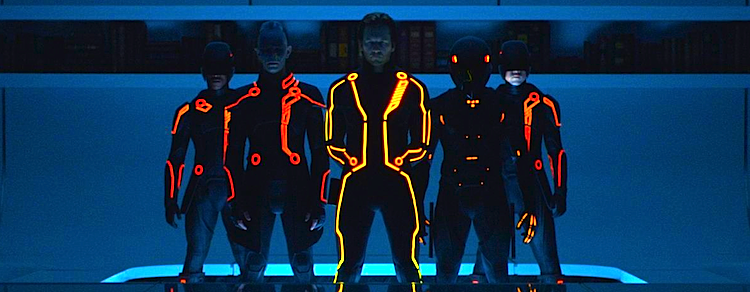
By Jason Apuzzo. There’s a moment late in Ridley Scott’s Blade Runner when Rutger Hauer, playing the doomed replicant ‘Roy Batty,’ turns to Harrison Ford just before dying, and with a mad gleam in his eye ruminates:
“I’ve seen things you people wouldn’t believe. Attack ships on fire off the shoulder of Orion. I watched C-beams glitter in the dark near the Tannhauser Gate. All those moments will be lost in time … like tears in rain.”
It’s a wonderful, sad, poetic, insane moment – the soul of the film, actually, as this fantastic and vaguely Nietzschean character expires with unexpected grace, and in so doing teaches his pursuer (Ford, the titular ‘blade runner’) something about the true nature of ‘humanity.’
In trying to summarize what director Joseph Kosinski’s Tron: Legacy lacks, it’s precisely such moments – or even one such moment. And it’s a shame, because I think that somewhere out there – perhaps still lurking in the interstices of the director’s imagination, or somewhere on his hard drive – there might actually have been a great science fiction film here, something perhaps south of Star Wars but certainly north of The Matrix. But as things stand, greatness was definitely left waiting on the table with respect to Tron: Legacy – this very big, very stylish and ambitious production that unfortunately never really takes flight as it should.
On the face of it, the idea of rebooting Tron was a decent idea, in so far as the cinema technology (CGI, 3D, etc.) currently exists today to flesh-out the basic Tron story in a more visually satisfying manner than was possible back in 1982. And, of course, since the early 80s we’ve obviously developed a much more precise feeling for what ‘cyberspace’ and the internet mean to us, on both a practical and symbolic level. Even just this week we learned, for example, that Facebook’s Mark Zuckerberg is going to be Time’s Man of the Year – and the movie made about him (the weirdly uninvolving The Social Network) is very likely to win Best Picture at the Academy Awards in a few months.
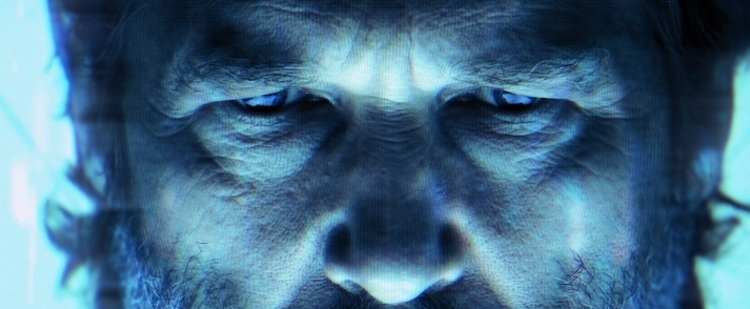
So on paper, the timing for this project should have been perfect. And yet I’m wondering if maybe it’s the exact opposite: that the timing for this film, in a sense, couldn’t be worse. Worse not because of the subject matter, nor because ‘computing’ has lost some of its romance and speculative luster since the early 80s – Steve Jobs notwithstanding.
The problem is with Hollywood itself. The industry has simply lost the ability to convey big ideas. It’s lost the feeling, the taste, the texture of big dreams. And that’s what haunts Tron: Legacy from start to finish.
Somewhere along the way a tale about what it means to be human in a technological age – a vast, endlessly fascinating subject – became … yet another story of Baby Boomer handwringing over what bad parents they are (yawn!). A fable about the closed nature of totalitarian systems became … an opportunity to synergistically cross-market video games, electronica and neon frisbees. An occasion for reflection on how big business simultaneously nurtures and stifles innovation became … Jeff Bridges channeling The Dude (by way of Phil Jackson).
In other words, something that started large and ambitious became incrementally smaller – and eventually missed whatever opportunity it had to make a Statement, or to write any poetry.
And it’s that Statement – however one may define it – that was the only good reason for Disney to have remade/rebooted/sequelized Tron to begin with. That’s what everyone’s thinking but not necessarily saying right now about this film – that however much money it makes (or doesn’t make), or whether it reboots the franchise or not, or whatever it does for Olivia Wilde’s career, etc. – an opportunity was lost here to really say anything, in the way that Star Wars, Blade Runner, Metropolis or even Avatar actually said something about the state of our world.
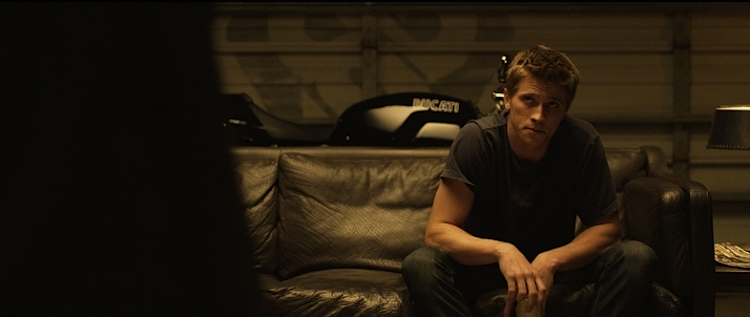
In Tron: Legacy we pick up in 1988, six years after the events of the original film, in a scene featuring the young/CGI Jeff Bridges as Kevin Flynn putting his son Sam to bed. Bridges is describing to Sam his wild experiences on The Grid, the virtual environment/alternate universe to which he’d travelled in Tron. Bridges here seems on his way to becoming another Steve Jobs or Bill Gates – a mega-entrepreneur and visionary with limitless ambitions for himself and his technology.
Bridges then vanishes that same night – we don’t know why, or to where. We only know that he’s left behind a bereaved son as heir to his company, and to the mystery not only of his disappearance – but of the true nature of his ‘legacy.’ What, really, did Bridges’ technology represent? Where was it headed? What purpose were his breakthroughs ultimately intended to serve?
Flash forward to the present day, as son Sam has become an expensive wastrel in the vein of Bruce Wayne – a spoiled, Gen Y slacker on a Ducati motorcycle doing his (not very) best James Dean imitation. In a passive-aggressive snit, Sam plays an expensive prank on his own company, ENCOM, by releasing the company’s big new OS for free onto the internet – just as the company is set for its IPO. (Look in this sequence, by the way, for an uncredited Cillian Murphy; he’s playing David Warner’s son from the original film, and will probably be the villain if there’s a sequel.)
Sam’s mentor (and Jeff Bridges’ old compatriot) Bruce Boxleitner isn’t too impressed, though. After Sam bails himself out of jail, Boxleitner visits him, scolds him – and informs him that, improbably, he’s just a received a page from Kevin Flynn’s office back at Flynn’s Arcade from the original film, a place that’s been closed for 20-some years. Out of nostalgia, and a hint of curiosity, Sam visits the arcade – cue a little 80s pop music here – and accidentally stumbles onto his Dad’s old office, where he unknowingly activates his Dad’s old digitizer beam and gets himself zapped back onto The Grid.
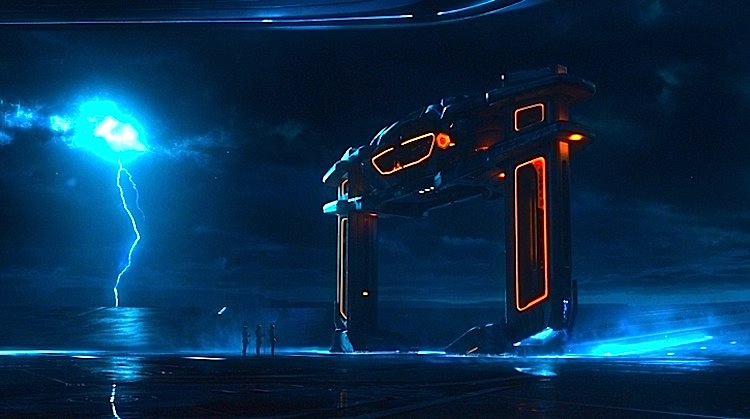
And this, as you can imagine, is really where the film takes off. The Grid, as Kosinski and his design team envisioned it, is probably one of sci-fi’s great visualizations – a feast for the eyes and senses, a neon-lit, noirish hell that borrows heavily from the final purgatorial dwelling of Keir Dullea in 2001.
The Grid has also, we learn, become something of a totalitarian state ruled over by Jeff Bridges’ youthful doppelganger, ‘Clu’ – actually just a computer program created by Bridges himself. Clu is the petty tyrant against which Sam and his father struggle for the rest of the film, aided in their effort by sprightly Grid-babe, ‘Quorra’ (Olivia Wilde).
That’s all you really need to know, because what follows is a flurry of sometimes exhilarating, sometimes tedious battles featuring neon frisbees and light cycles – and also aircraft that look a little too much like X-wings. You also get an ocean of Baby Boomer regret from Jeff Bridges for being an absentee father – tell me if you haven’t heard that one before – and some light flirtation from Quorra that never really amounts to much.
In the midst of this, though, there is an unmistakeable portentousness to the proceedings … a dark fog that hangs low over everything, a sinister allure that keeps you hoping that something special is going to happen. Is it the mood lighting? The marvelous production design? Maybe it’s the swagger of the women, who sometimes look like they stepped out of Gerry Anderson’s U.F.O.
The music, incidentally, helps immeasurably here. Kosinski was absolutely brilliant to get Daft Punk involved in this film, because their soundtrack brings a momentum and scale to the story that the characters themselves aren’t always able to provide.
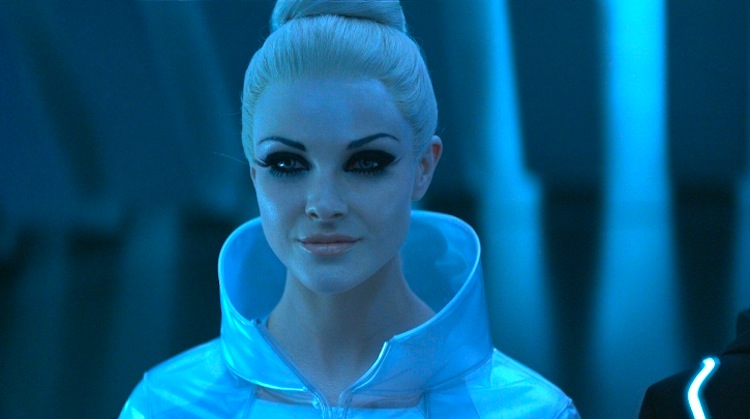
At its best moments, the world of The Grid feels a great deal like The Death Star from the original Star Wars – a utilitarian nightmare of shiny surfaces, featureless walls and marching troops. George Lucas to some extent got away from that in the later Star Wars films, but that ‘vision’ of totalitarian sameness comes back here in full force – and still works wonders, in my opinion.
The film’s real problems begin and to some extent end with Garrett Hedlund playing Sam Flynn. Much has been made of the fact that a young, CGI Jeff Bridges appears in the film as Clu, but I’m convinced that the actual CGI character in this film is played by Hedlund – who gives a completely flat and affectless performance as Sam, a character that was already poorly written to begin with. Hedlund’s performance is the lead weight that drags the film down, never allowing it to take flight. His Sam Flynn is basically indistinguishable from every other Gen Y WASP male – from Harry Potter to Peter Parker – who’s got to hit his prescribed stations on the ‘hero’s journey’ at regular 20 minute intervals. (Wise mentor? Check! Magical weapon? Check! Plucky sidekick? Check!). It’s such a bore. Hollywood screenwriters should be banned from reading Joseph Campbell for the next 30 years unless they prove they can bring something new to the equation – like maybe some women or ethnic faces, by the way.
The film’s freshest, liveliest sequence comes courtesy of Michael Sheen, Beau Garrett and the Daft Punk boys – who inhabit a kind of sexy techno lounge where Hedlund goes looking for help. Sheen is decked-out like some bizarre, 80s glam rocker (Flock of Seagulls?) and chews scenery while Beau Garrett smolders and Daft Punk rocks the joint with killer techno – and I generally don’t even like techno. Sheen comes damn near close to stealing the show in this sequence, and the film needed a lot more extravagant characters like his in order to work – because the Tron universe feels perilously thin and light on personality. A film like Blade Runner, for example, had about 6 or 7 great supporting characters who made the whole thing work; Tron: Legacy has maybe 2 at best (Sheen and Garrett). The scene in the lounge gives the audience a fleeting glimpse of what this film might have been, had a genuinely baroque imagination been given free reign to populate Tron‘s world with exotic characters.

A few words on Olivia Wilde, incidentally, who’s getting a lot of hype right now. Sorry, but she does absolutely nothing for me, her phony cackling in the film was annoying, and she’s easily the second hottest female in this movie after Beau Garrett – who is the real find here and smokes Wilde right off the screen.
As for the digital Jeff Bridges? It doesn’t work. Clu does not, in my opinion, make it through the Uncanny Valley – and I found myself wishing Kosinski had simply dropped the idea altogether. A little of Jeff Bridges goes a long way in this film, anyway; his rambling, Buddhistic soliloquies got dull quickly. If I want Phil Jackson, I’ll just watch a Laker press conference.
Tron: Legacy actually presents us with the horrifying possibility that we will never truly be rid of the Baby Boomers, who can now apparently inflict their digital avatars on us in perpetuity – long after their youth and looks are gone. Who’s to say Barbra Streisand isn’t calling up Robert Redford right now and planning a CGI The Way We Were for next summer? Nothing would surprise me, at this point. I actually think it would’ve been classier for Bridges to refuse this kind of treatment, and give the role of Clu to a younger actor who needed it. That’s not the Boomer way, though, is it? The true ideology of their generation isn’t leftism so much as narcissism.
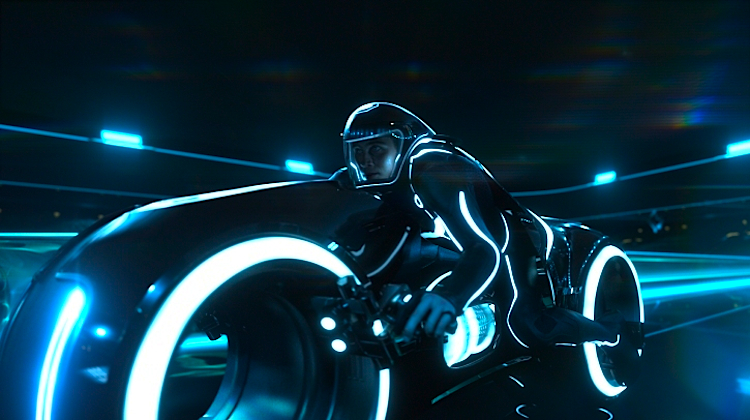
A final word on the film’s politics. Tron: Legacy is, ultimately, a generic parable about the dangers of totalitarianism. Early in the film, it is noteworthy that Clu’s stormtroopers seem to be rounding up ethnic minorities of various sorts (although you’ll miss this if you blink), suggesting that the critique here is of race-based ideologies, but Tron does not seem to direct its critique at any particular style of totalitarianism. The film’s thematic thrust is broadly humanistic … and perhaps a little bland, as a result. The real fear expressed in the film seems to be that the Baby Boomers have left a legacy of enforced sameness, a legacy one may interpret as political or as a phenomenon of private industry.
Or as a characteristic of Hollywood moviemaking? Ahem.
Beyond that, I think that both Olivia Wilde and Bruce Boxleitner in their public statements have probably been reading a bit too much into the film, or reacting to scenes that were cut out. (There’s no indication, for example, that ENCOM has become a defense contractor. I’m assuming that’s somewhere on the cutting room floor?) In any case, there’s very little ‘politics’ to speak of here; and, ironically, the whole purpose of the story seems to be to make Sam Flynn into a better CEO. Ms. Wilde didn’t seem to notice that part.

Tron also stands light years away from Avatar’s full-throated advocacy of violence, or of taking up arms against The Man. And, again unlike Avatar, Tron isn’t interested in keeping its character in its virtual world. The idea seems to be to prepare Sam to live a better life in the real world, with a real woman. That basic, humanistic message is very much in keeping with the original film – and I commend Disney and Kosinski for keeping it.
It’s too bad, though, that Tron‘s commendable morality wasn’t matched by its poetry. The film never quite took me to the Tannhauser Gate … and I very much wanted to go there.
Posted on January 17th, 2010 at 9:49pm.
“That’s not the Boomer way, though, is it? The true ideology of their generation isn’t leftism so much as narcissism.”
I’ve also believed this — well played, Jason. It has to be their narcissism and overall handwringing that makes them so susceptible to leftist ideology … because when you challenge them, they just can’t construct an intellectual defense — everything is emotionally driven.
Wonderful review, Jason — you really knocked it out of the park.
Thanks very much, Vince.
Me neither. I haven’t seen Tron: Legacy, but Olivia Wilde is always just negative space on screen.
Basically she’s being over-hyped. She doesn’t really add much to the proceedings.
My two-word review of Tron: Legacy is “Oppressively Dull.”
A virtual world is a great place to create a parable about the dangers and allure of totalitarianism, but Tron is a shark circling the waters with no teeth. Too much time is spent explaining the world rather than experiencing it.
Clu is a totalitarian despot, but he’s against what, exactly? Users? And Jeff Bridge’s Flynn is camped out approximately 3.5 miles away, but Clu and his minions are unable to find him in the previous 22 years until Sam takes his lightcycle into the city where it is traced? Even though Quorra has been coming and going there for lord knows how long? The script obviously needed a few more (or less) revisions.
Digital Jeff Bridges should be sent packing via The Polar Express.
Michael Sheen’s looks says more Ziggy Stardust/David Bowie to me than Flock of Seagulls. And what’s funny is that when he first appears onscreen, my brain went “Oh look, Tony Blair!”
Good review, Jason.
Thanks, EMD. Yes, I should’ve mentioned some of those strange and glaring plot problems … because what they add up to is a situation in which Sam’s ‘heroism’ is too easily earned. There’s no point in the film where the kid really gets his teeth kicked in, which is part of the problem.
Nice analysis on your part. Yeah, I think Ziggy Stardust is a little closer …
I enjoyed it. A nice, clean, action/adventure movie that was totally appropriate for my 12 year old and also my 6 year old. Sure, it won’t win a ton of awards, but I am starting to be of the opinion that most critics are expecting too much from films these days. I don’t need every movie to redefine the genre, sometimes I just want to sit back and be entertained.
That’s fine Shane, and understandable, but I also think that if people demand more they might occasionally get more.